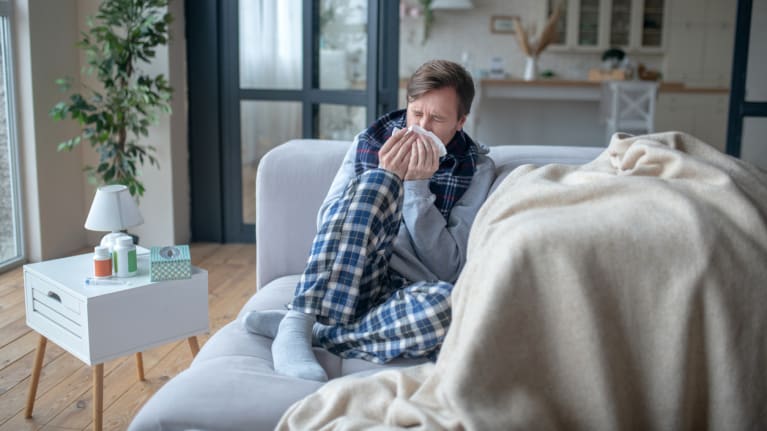
In the past, when employees got a cough or cold, they would often push through and go into work anyway because they didn’t want to use up their sick days.
But when COVID-19 came along, that changed. Employees’ approach to taking time off experienced a seismic shift. Many workers—especially younger ones—are now putting their mental and physical health first, taking more sick days and giving themselves space to breathe and rest away from their jobs.
According to a recent Gusto survey of over 300,000 small and midsized businesses, 30 percent of all employees in the professional services industries who get paid time off (PTO) have taken sick leave so far this year, an increase of 42 percent from 2019.
The average amount of sick time these workers have taken has increased by 15 percent since 2019 and is now 15.5 hours per year. The largest increase is among workers ages 25-34: Nearly a third (32 percent) of them have taken sick leave in 2023, compared to 28 percent of workers ages 35-54.
Employers around the U.S. are figuring out how to respond to this growth while ensuring that employees are healthy—in every way. These are the trends they’re seeing, as well as their reactions.
Workers Are Staying Home When Sick
When COVID-19 struck, people were masking up, practicing social distancing and canceling activities if they had a slight sniffle. That mindset has impacted how employees take sick days now.
Danielle Tabor, chief people officer at Emburse in Portland, Maine, has noticed that many of the company’s 900 employees are staying home when they feel sick.
“There used to be a tendency to come in, not put in your best work and risk making your colleagues sick, which is incredibly counterproductive,” she said. “Since COVID, people have certainly changed that attitude, thankfully. Those who [work in] one of our offices know that they need to stay away, and even among our remote workforce, most people have adopted the mindset that it’s better to take a day or two off and recuperate rather than work for three or four days at half speed.”
Emburse lets employees take up to three sick days at a time and promotes a culture of transparency.
“If someone says they are sick, there has to be an element of trust that they’re telling you the truth,” Tabor said. “If someone is out for more than three days, our policy is to request a doctor’s note, and obviously, if somebody takes way more sick days than normal without good reason, we’ll ask their manager to keep an eye on things to make sure that it’s not something more serious. But that’s incredibly rare.”
Workers Are Taking More Mental Health Days
“We’re seeing ‘I need a day off to realign’ or ‘mental health day’ reasons more often,” said Shri Ganeshram, CEO of San Francisco-based Awning, which has 50 employees. “I remember this one time, one of our developers, usually the never-sick kind, took a day off, citing mental exhaustion. It was a small alert to a larger pattern.”
Christopher Pappas, founder of eLearning Industry in San Francisco, where he leads a team of 50 employees, doesn’t mind letting employees take time off to recharge.
“The pandemic has taken a toll on everyone’s mental health, and we encourage our employees to take care of themselves,” he said. “I am completely OK with it. It’s important for employees to prioritize their health and well-being. I believe it’s crucial for companies to be understanding and supportive during these challenging times.”
Neci Kalisz, HR lead at Regex SEO in Houston with 35 employees, echoed that sentiment.
“I’d be empathetic to people who are forced to take sick days instead of mentally recharge [on] days off,” she said. “And I’m also delighted that our company promotes honesty, allowing us to openly acknowledge when we’re feeling overwhelmed and require time to address personal matters. This approach contributes to a more pleasant working atmosphere within our team.”
Being Proactive About Sick Days and Mental Health
Some companies aren’t waiting for employees to come to them about their health concerns. Instead, they are being proactive and providing employees with the time off they need before things get to that point.
At Regex SEO, each employee can take two mental health days per month. And Emburse has a take-what-you-need PTO policy, so employees don’t feel like they have to work in order to conserve sick days.
“Mental health is something that’s been overlooked for way too long, and we really encourage people to look after that as much as their physical health,” Tabor said.
Additionally, Emburse has procedures in place to prevent employee burnout. When the pandemic began, Tabor and her team noticed that people were canceling vacations and PTO in the hope that they could take them later.
“When it became apparent that [the pandemic] wouldn’t be over in a couple of months, we wanted to avoid burnout, so we implemented quarterly ‘Unplugged Days,’ where the entire company closes down for a day,” she said. “What’s great about this is that when everyone else is off, your phone doesn’t keep pinging with email and Slack messages, so it’s really a great way to disconnect and get away from your work. They proved to be a real hit, so we’ve kept them going.”
To Ganeshram, it’s clear that this new way of working is not only beneficial to employees—it’s a positive thing for employers as well.
“If someone needs time to recharge, that’s important for their well-being and, by extension, their productivity,” he said. “The pandemic taught us resilience but also the importance of vulnerability. If sick days help my team stay healthy, mentally and physically, I’m all for it. They come back stronger, and it’s a win-win.”
Kylie Ora Lobell is a freelance writer based in Los Angeles.


